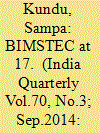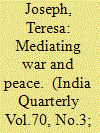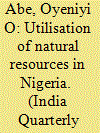| Srl | Item |
| 1 |
ID:
132906


|
|
|
|
|
| Publication |
2014.
|
| Summary/Abstract |
Bay of Bengal Initiative for Multi-sectoral Technical and Economic Cooperation, the inter-regional mechanism which was initiated primarily as a combination of India's Look East Policy and Thailand's Look West Policy, need to be reviewed in terms of achievements and difficulties faced so far as it has already completed first 16 years of existence. This article aims to identify its shortfalls and positive aspects in order to understand its potential, if there are any.
|
|
|
|
|
|
|
|
|
|
|
|
|
|
|
|
| 2 |
ID:
132908


|
|
|
|
|
| Publication |
2014.
|
| Summary/Abstract |
Promotion of renewable energy and application of clean technology are essential for limiting emissions of GHG and facilitating environmentally compatible development. Although India and the European Union (EU) recognise their vulnerability to climate change, they differ on their 'normative claims' of the global climate change regime. India and the EU do not agree on emission cut targets. They can cooperate in multiple ways in the areas of clean technologies, renewable energy, research and development and sharing knowledge for sustainable development planning, etc. India has adopted a comprehensive National Action Plan on Climate Change (NAPCC), which comprises of both mitigation and adaptation measures to climate change. The implementation of the NPACC would be crucial in shaping a policy for inclusive and sustainable development. Hence, cooperation between India and the EU can take place in areas of the NAPCC that would help not only in coping with climate change, but also in enhancing India's economic relations as well as development partnership with the EU.
|
|
|
|
|
|
|
|
|
|
|
|
|
|
|
|
| 3 |
ID:
132905


|
|
|
|
|
| Publication |
2014.
|
| Summary/Abstract |
Following the end of the Cold War, South Asia has been in transition in a number of ways. Based on the Kantian tripod of democracy, economic interdependence and institution, this article assesses whether liberal peace has taken root in South Asia. It concludes that although an incipient liberal order may be discerned in the region, South Asia has yet to change fundamentally to become a zone of liberal peace. Particularly the Indo-Pakistani relationship remains frosty which constrains the building of a liberal order in the region.
|
|
|
|
|
|
|
|
|
|
|
|
|
|
|
|
| 4 |
ID:
132907


|
|
|
|
|
| Publication |
2014.
|
| Summary/Abstract |
Technological developments over recent years have ensured that the mainstream mass media will play a growing role in social and political processes, and in shaping perceptions and policies relating to domestic as well as international conflicts. Keeping in perspective the potential capability of the news media in situations of conflict and conflict resolution, this article maps the underlying trends in the role of the mainstream international news media in contemporary conflicts, and the issues and challenges that characterise media coverage of such issues. Identifying some of these trends to be-the reflection of the dominant discourse, framing of news along official lines, dehumanising language of war, media management by governments, selective reporting, demonisation of enemies, and so on-the article throws light on the concept of 'peace journalism' as an alternative to conventional news coverage of conflict.
|
|
|
|
|
|
|
|
|
|
|
|
|
|
|
|
| 5 |
ID:
132909


|
|
|
|
|
| Publication |
2014.
|
| Summary/Abstract |
Environmental justice continues to be a concept that seemingly eludes our human capability; yet, the economic benefits derivable from exploration and utilisation of the environment are unquantifiable. A brief attempt on environmental rights and its applicability in practice in Nigeria has been carried out in this article. The article analyses the nature of the socio-political impulses at work in ensuring that environmental justice is either hindered or realised. While examining the right to clean environment, this article discusses the culpability of transnational corporations for their acts in environmental degradation. It argues for the enforceability of environmental justice under the constitution and indeed under customary international law. It also examines the implications of several international human right treaties which Nigeria has assented to. The article calls for more punitive measures in environmental statues. Nigeria must adopt international principles aimed at safeguarding the rights and interest of peoples on earth. Not only must there be the means to implement these rights, but also there must be adequate and responsible enforcement mechanisms in place. Government must not only be serious but must also be manifestly seen to be so.
|
|
|
|
|
|
|
|
|
|
|
|
|
|
|
|